The benefits and harms of celery for gout
The roots, leaves and rhizomes of celery are widely used in cooking and are often recommended as a therapeutic food for various diseases. Having a low calorie content, the vegetable contains a lot of fiber, minerals, amino acids, essential oils, and vitamins, which makes it a healthy food for people suffering from gout.
Chemical composition, trace elements and characteristics of celery
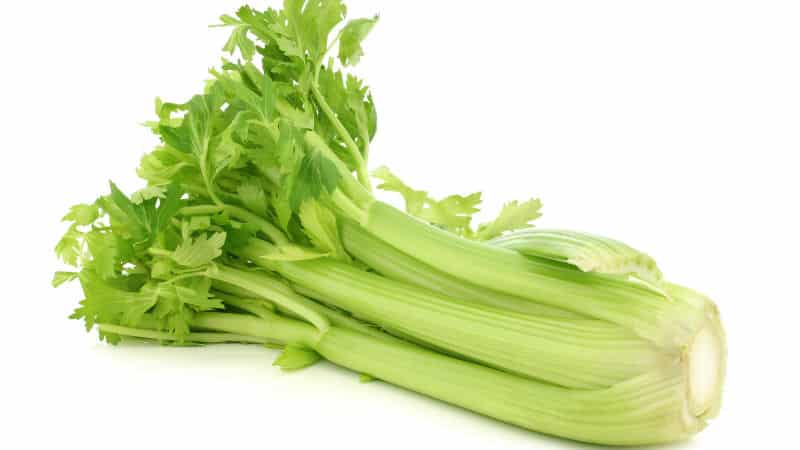
Content of nutrients (vitamins and minerals) per 100 g of edible part:
| Organic acids | 0.1 g |
| Alimentary fiber | 1.8 g |
| Water | 94 g |
| Ash | 1 g |
| Vitamins | |
| Vitamin A, RE | 750 mcg |
| beta carotene | 4.5 mg |
| Vitamin B1, thiamine | 0.02 mg |
| Vitamin B2, riboflavin | 0.1 mg |
| Vitamin B3, niacin | 0.4 mcg |
| Vitamin B4, choline | 6.1 mg |
| Vitamin B5, pantothenic acid | 0.246 mg |
| Vitamin B6, pyridoxine | 0.08 mg |
| Vitamin B9, folates | 21 mcg |
| Vitamin C, ascorbic acid | 38 mg |
| Vitamin E, alpha tocopherol, TE | 0.5 mg |
| Vitamin H, biotin | 0.65 mcg |
| Vitamin K, phylloquinone | 29.3 mcg |
| Vitamin RR, NE | 0.5 mg |
| Macronutrients | |
| Potassium, K | 430 mg |
| Calcium, Ca | 72 mg |
| Silicon, Si | 2.9 mg |
| Magnesium, Mg | 50 mg |
| Sodium, Na | 200 mg |
| Sera, S | 6.9 mg |
| Phosphorus, Ph | 77 mg |
| Chlorine, Cl | 26.8 mg |
| Microelements | |
| Aluminium, Al | 129.8 mcg |
| Bor, B | 72.2 mcg |
| Vanadium, V | 24.2 mcg |
| Iron, Fe | 1.3 mg |
| Yod, I | 7.5 mcg |
| Cobalt, Co | 0.86 mcg |
| Lithium, Li | 8.2 mcg |
| Manganese, Mn | 0.103 mg |
| Copper, Cu | 35 mcg |
| Molybdenum, Mo | 5.4 mcg |
| Nickel, Ni | 14 mcg |
| Rubidium, Rb | 153 mcg |
| Selenium, Se | 0.4 mcg |
| Strontium, Sr | 69 mcg |
| Fluorine, F | 4 mcg |
| Chromium, Cr | 2.1 mcg |
| Zinc, Zn | 0.13 mg |
| Digestible carbohydrates | |
| Starch and dextrins | 0.1 g |
| Mono- and disaccharides (sugars) | 2 g |
| Saturated fatty acids | 0.042 g |
| Polyunsaturated fatty acids | |
| Omega-3 fatty acids | 0.018 g |
| Omega-6 fatty acids | 0.079 g |
Calorie content, nutritional value, glycemic index
The nutritional value of celery is 13 kcal, but it may increase depending on the method of heat treatment.. The most high-calorie part of the plant is the root - 42 kcal.
Proteins, fats and carbohydrates are distributed unevenly. Most of them are found in the rhizome (proteins - 1.3 g, fats - 0.3 g, carbohydrates - 6.5 g), in smaller quantities - in the stems and leaves (proteins - 0.9 g, fats - 0.1 g, carbohydrates - 2.1 g).
Glycemic index raw celery - 35 units, boiled without salt - 85 units.
What vitamins are present in celery
Celery is used as a source of many vitamins and microelements. These compounds are needed to ensure vital processes, protect the body from the effects of negative factors, strengthen the immune system, and feel good.
The intake of all necessary substances into the body reduces the symptoms of gout, prolongs remission, and sometimes prevents its occurrence.
Vitamin composition in celery:
- Retinol. Indispensable for the development of epithelial cells, maintains eye hydration, protects against drying out, and takes part in the formation of new cells.
- Beta carotene. Neutralizes free radicals, maintains the functional condition of the skin and mucous membranes, ensures proper functioning of the visual organs, sweat and sebaceous glands.
- Vitamin B1. Reduces blood sugar levels, suppresses appetite, and supports the health of the digestive and nervous system.
- Vitamin B2. Regulates the functioning of the thyroid gland, takes part in the creation of new blood cells, restores body tissue, and supports energy metabolism.
- Vitamin B4. Improves neuromuscular transmission, increases brain performance and memory, reduces the risk of developing cardiovascular pathologies.
- Vitamin B5. Affects carbohydrate, protein and lipid metabolism, stimulates the production of adrenal hormones, improves immunity.
- Vitamin B6. Improves contractility of the heart muscles, reduces numbness of the limbs, convulsions, spasms, acts as a diuretic.
- Vitamin B9. Ensures proper functioning of the immune and circulatory systems, resists heart disease, neurological damage, and senile dementia.
- Vitamin C. An important component of redox reactions in the body, it increases the strength and elasticity of the walls of blood vessels, reduces their permeability, and protects the body from influenza and infections.
- Vitamin D. Ensures the development and growth of bones, normalizes blood clotting, and prevents the occurrence of cancer cells.
- Vitamin E. A powerful antioxidant, reduces glucose levels, improves blood circulation, supports metabolism, stimulates collagen production.
- Vitamin H. Normalizes intestinal microflora, prevents flaking and dry skin, brittle hair and nails, and is important for the health of tendons.
- Vitamin RR. Improves the activity of blood vessels, reduces the level of bad cholesterol, removes waste, toxins and other harmful substances from the body.
Can I use it for gout?

For gout patients, doctors prescribe strict diet, which significantly improves their condition, normalizes the production of uric acid.The diet should be nutritious, varied, with a decrease in protein in the diet to 70 g and a limit on fats, which slow down the excretion of uric acid salts by the kidneys.
Important. The energy value of the diet is 2500-2700 kcal, since in many patients with gout it is obesity that underlies the dysregulation of purine metabolism.
Nutritionists recommend including more in your diet vegetables, which have an alkalizing effect. Among them is celery. All parts of the plant are suitable for consumption, raw or after cooking.
The benefits and medicinal properties of celery for gout
Regular consumption of celery to some extent affects the causes of gout, alleviates the severity of symptoms, and prevents the formation of urate deposits in the kidneys and joints.
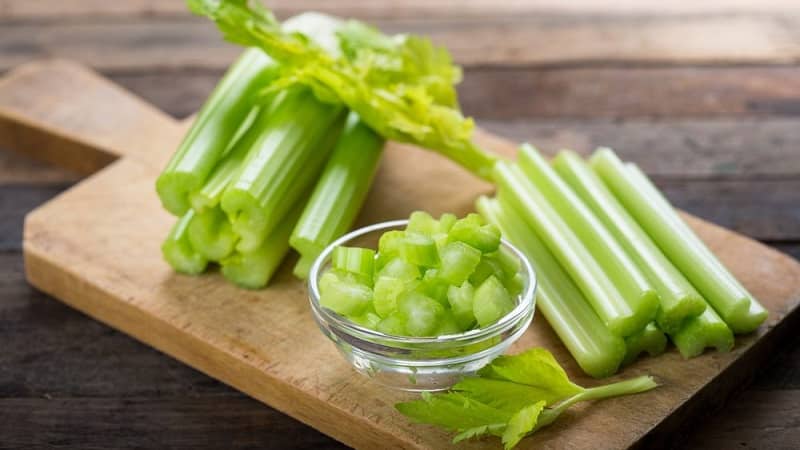
Beneficial properties of celery, which are taken into account for the treatment and prevention of gout:
- regulates blood cholesterol levels;
- removes excess sugar;
- speeds up metabolism;
- enhances intestinal motility;
- improves digestion;
- activates the process of fat breakdown;
- regulates acid-base balance;
- inhibits inflammatory processes;
- relieves pain, redness, swelling;
- increases range of motion in the affected joint;
- protects the body from microbes, preventing or suppressing their growth, preventing their spread in the body;
- dissolves and removes uric acid salts, preventing their accumulation and the formation of gouty nodes;
- cleanses the body of toxins, toxins and other harmful substances.
Celery for gout is valued for the presence of plant fiber, which is especially useful for overweight people.Dietary fiber, entering the intestines, swells and takes up free space, thereby ensuring quick saturation with one small portion.
Plant fiber increases endurance and performance, stimulates physical activity, as a result, more energy is consumed than it receives, and the body begins to waste fat reserves, body weight decreases.
For reference. With the transition to an alkaline diet, mood improves, mental performance and attention increase, and night sleep improves.
Harm and contraindications to eating celery for gout
Despite all the advantages of celery as a means of treating gout and preventing gout attacks, it still has certain contraindications:
- individual intolerance to the product;
- low stomach acidity;
- gastrointestinal diseases of an erosive-ulcerative nature in the acute stage;
- severe renal and liver failure;
- varicose veins of the esophagus;
- anemia;
- severe urolithiasis;
- epilepsy;
- pathologies of the endocrine system.
During pregnancy, especially in later stages, it is recommended to limit celery in the diet. It increases blood flow to the uterus, tones the muscles, which can cause premature birth and involuntary termination of pregnancy. External use of celery for the above conditions is not prohibited, including for pregnant and lactating women.
When celery is consumed within normal limits, there is no health risk. Adverse reactions are extremely rare and are usually associated with the presence of contraindications.In turn, an excess of alkaline foods in the diet, including celery, gives rise to various skin diseases, allergic reactions, and disrupts the functionality of the digestive system.
How to use correctly and norms
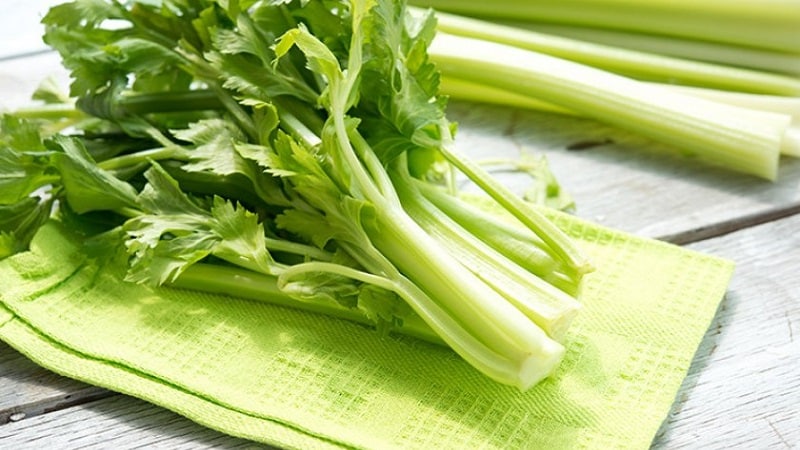
Treatment of gout with celery is carried out in various ways: include it in the daily diet, observe fasting days based on celery soups, juices, and salads. All parts of the plant are added to first and second courses, processed into juice, smoothies, stems are used instead of salt. Celery is consumed raw, boiled, baked, dried for subsequent addition as an aromatic seasoning in soups and side dishes.
Celery intake is recommended at a time convenient for you. It is important not to consume more vegetables than normal. For an adult, the average norm per day is 200-300 g of celery, unless we are talking about a fasting day or a celery diet. Then the amount of vegetables in the diet increases, since other products are sharply limited.
How to choose fresh celery
The benefits of celery for the body and the treatment of gout directly depend on the quality of the product used. Choose a vegetable grown in guaranteed safe conditions without the addition of pesticides and other harmful substances.
When buying celery, pay attention to the smell and its appearance. A product of proper quality has:
- dense and elastic stems that produce a crunching sound when broken;
- root vegetables of medium size, dense, with a moderate root system;
- pleasant spicy aroma;
- brightly saturated greens without signs of wilting, yellow spots, or traces of damage by insects.
How to store
The shelf life of celery is determined by the maturity and naturalness of the product.Vegetables grown without the addition of pesticides, like overripe ones, spoil faster. Optimal conditions for storing celery are air temperature +1…+3°С.
In the refrigerator, celery leaves retain their nutritional and taste qualities for two weeks, and the root for a month. It is important that any part of the plant is packaged in non-sealed plastic bags with air access.
The shelf life of rhizomes can be increased to 3-4 months. To do this, make a sand cushion in a wooden box, lay the roots on top, and sprinkle them with dry sand. Store in a dark and cool place, ideally in a cellar.
In what form to use
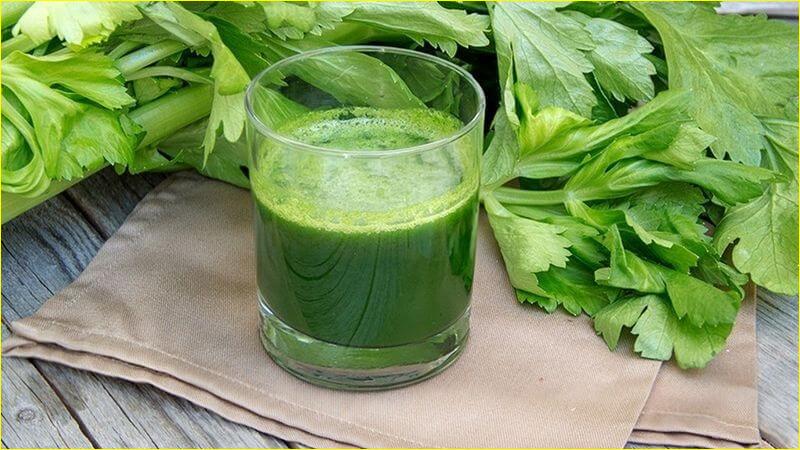
All parts of the plant are used fresh or subjected to heat treatment. In order to preserve as much as possible the substances valuable for the human body, the vegetable is baked, stewed, and boiled.
In any form, celery is added to soups, salads, side dishes, sauces and seasonings, processed into juice, smoothies are prepared, and used in desserts.
Advice. When preparing any dish from celery, try to make it less caloric. Do not use cooking and animal fats, high-calorie sauces, limit the amount of salt and vegetable oil.
What do they eat with?
Celery goes well with almost all foods, including:
- vegetables: tomato, sweet pepper, cabbage, potatoes, onion, garlic, carrots, broccoli, zucchini, eggplant, carrot;
- fruits: orange, pineapple, apple, pear, peach, grapes, lemon, kiwi;
- berries: blueberries, blackberries, raspberries;
- garden greens;
- dried fruits: prunes, dried apricots, raisins, figs;
- meat dishes: fish, chicken, red meats;
- cereals;
- legumes;
- eggs;
- cottage cheese;
- cheeses;
- sour cream, yogurt.
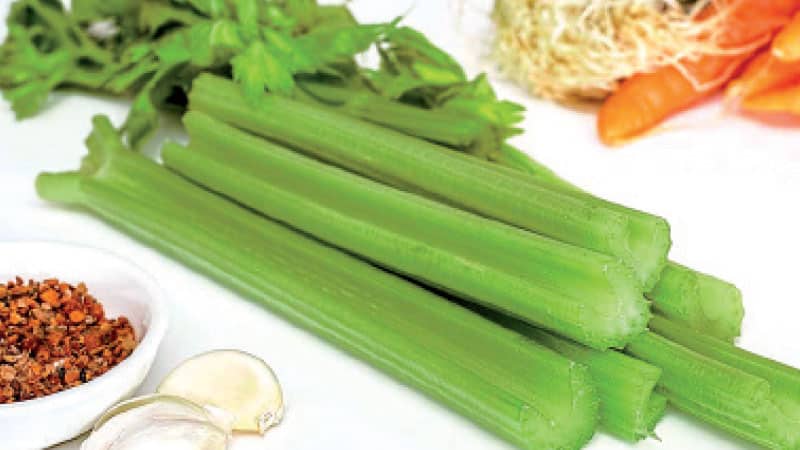
Due to its food compatibility, celery is widely used as an auxiliary component of first and second courses, salads, and spices. Can be consumed on its own, as a separate dish.
Recipes for treating gout with celery
Since food for gout should be low in calories and still make you feel full, nutritionists recommend celery soup. You can cook it with water or weakly concentrated chicken broth. The list of products is varied and can be changed depending on personal taste preferences.
Ingredients:
- bouillon;
- tomatoes;
- carrot;
- onion;
- celery root and greens;
- Brussels sprouts;
- Bulgarian pepper;
- greenery;
- spices;
- salt to taste.
Recipe:
- Wash, peel and bake the celery root in the oven. This will add flavor and piquancy to the dish.
- Finely chop the baked root along with the rest of the vegetables and add to the boiling broth.
- Cook over low heat for 10-15 minutes with the lid closed.
- 5 minutes before it’s ready, add salt to taste, add spices, and garnish with herbs on top.
Those who prefer cream soup can beat the finished soup with an immersion blender until creamy, add 2 tbsp. l. low-fat cream and boil again. Serve with rye crackers.

No less popular and beneficial for gout patients is celery juice.
The recipe is simple:
- Rinse the celery leaves well and remove excess moisture with a paper towel.
- Process the leaves in a juicer, then squeeze out the juice and strain.
- Take chilled.
The variety of celery-based salads is amazing. Here is one of the simplest and most inexpensive recipes:
- Cut fresh cucumber into strips.
- Peel the celery root and also cut into strips.
- Cut boiled quail eggs into halves.
- Grate fresh carrots using a Korean grater.
- Mix all products, season with natural yoghurt or low-fat sour cream.
Those who prefer a more satisfying dish can add boiled turkey fillet, chicken, or squid to the salad.
Conclusion
The dietary and medicinal properties of celery make it a useful product for people suffering from gout. Celery juice, smoothies and other dietary dishes with its participation must be present in the daily diet. The vegetable enhances the effectiveness of basic treatment methods, alleviates the severity of symptoms, and prevents the occurrence of complications.
Due to the presence of contraindications, before deciding to use celery for gout, it is recommended to consult a specialist - a rheumatologist, nutritionist.